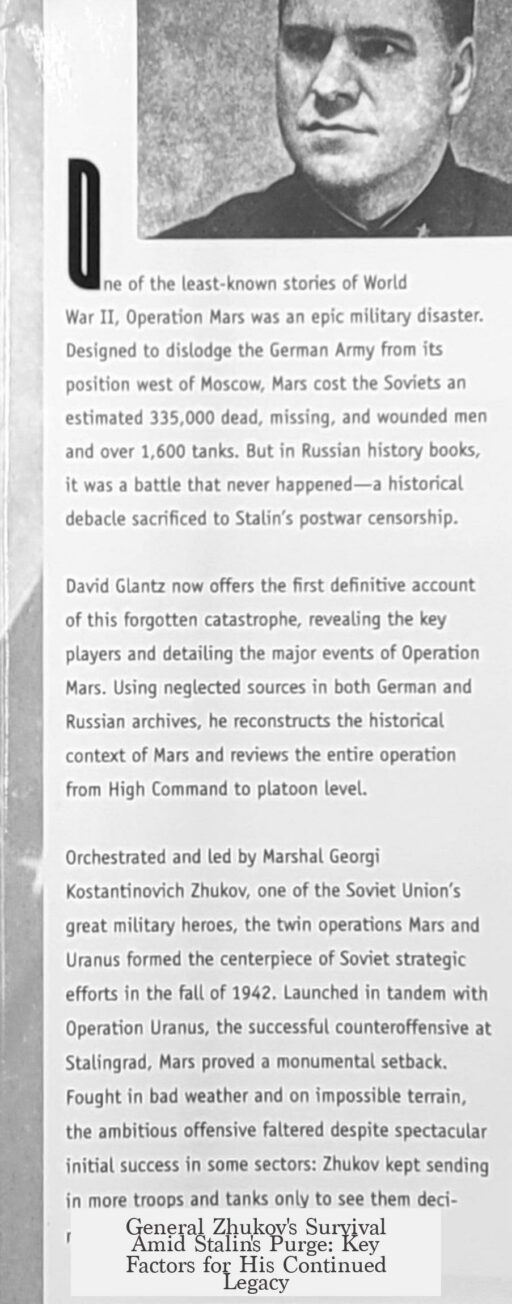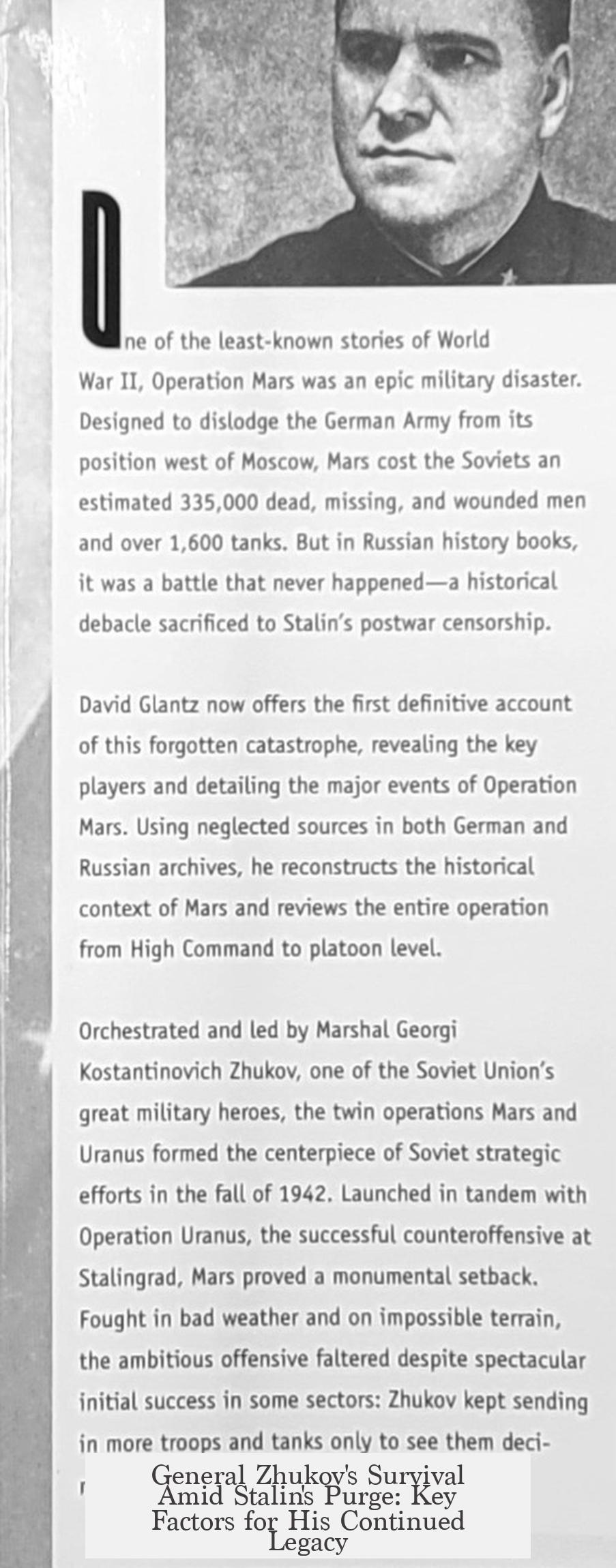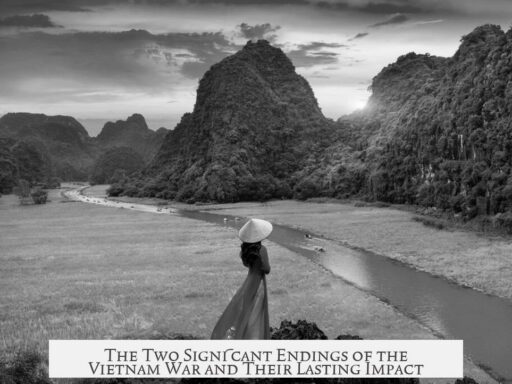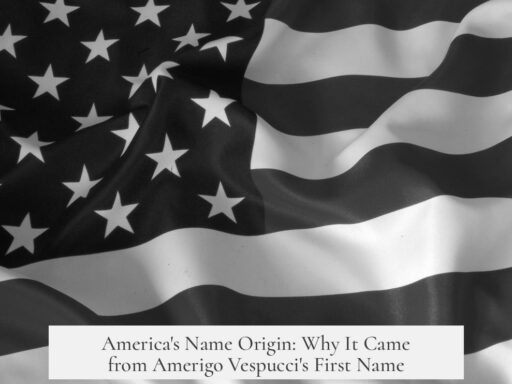General Georgy Zhukov avoided Stalin’s purge due to a blend of his social background, military prowess, strategic loyalty, and favorable circumstances that aligned with Stalin’s criteria for trustworthiness. Unlike many others purged, Zhukov did not appear as a political threat to Stalin. He rose from a poor peasant family and steadily advanced in the army without any overt political ambitions that would alarm Stalin. His military skills, public popularity, and careful distancing from suspect factions contributed significantly to his survival during a time of brutal political purges.
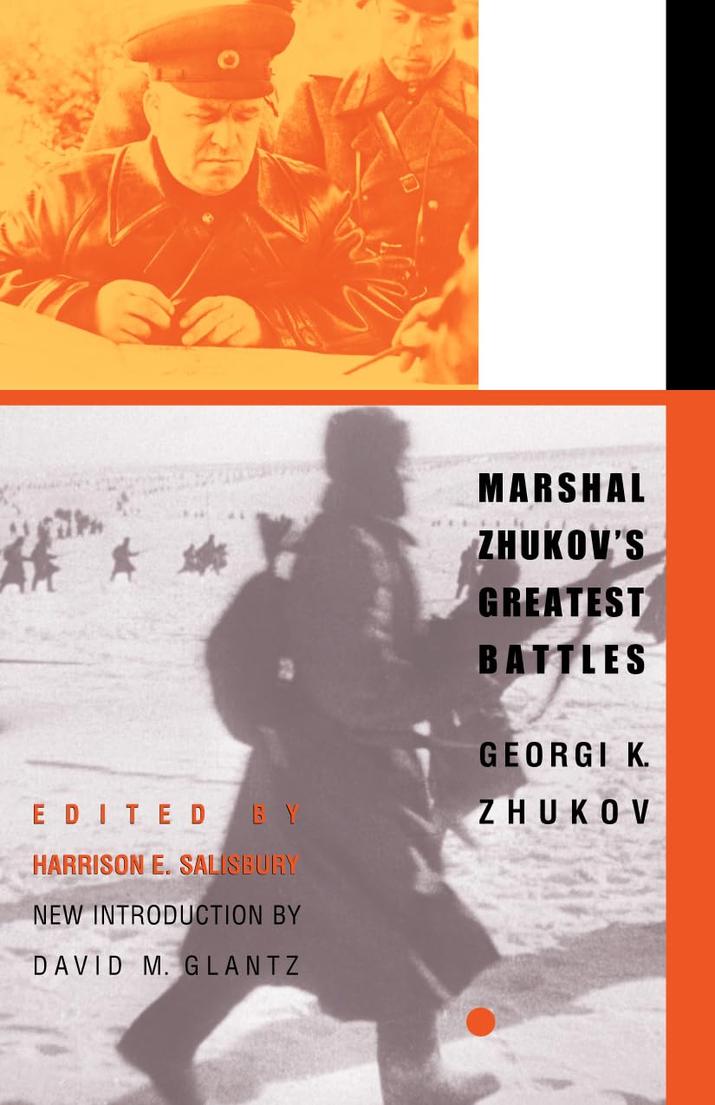
Stalin’s purges mainly targeted those perceived as disloyal, politically dangerous, or a threat, often focusing on secret Trotskyists and former Tsarist officers. Zhukov’s lack of connection to these groups made him less vulnerable. His peasant origins aligned with Stalin’s own background, making him appear more “reliable” and less likely to harbor opposition. Additionally, Zhukov’s service during the Russian Civil War, especially in the First Cavalry under commanders not linked to Stalin’s rivals, reinforced Stalin’s trust in him.
Zhukov’s military competence rapidly gained Stalin’s attention. His expertise in tank and combined arms warfare matched the rising strategic focus of the Soviet military. Before the height of World War II, Zhukov earned distinction fighting the Japanese at Nomonhan in 1939. His success there secured the “Hero of the Soviet Union” honor and solidified his reputation within Stalin’s command circle. This battlefield success made Zhukov invaluable, preventing Stalin from considering him expendable amid the purges.
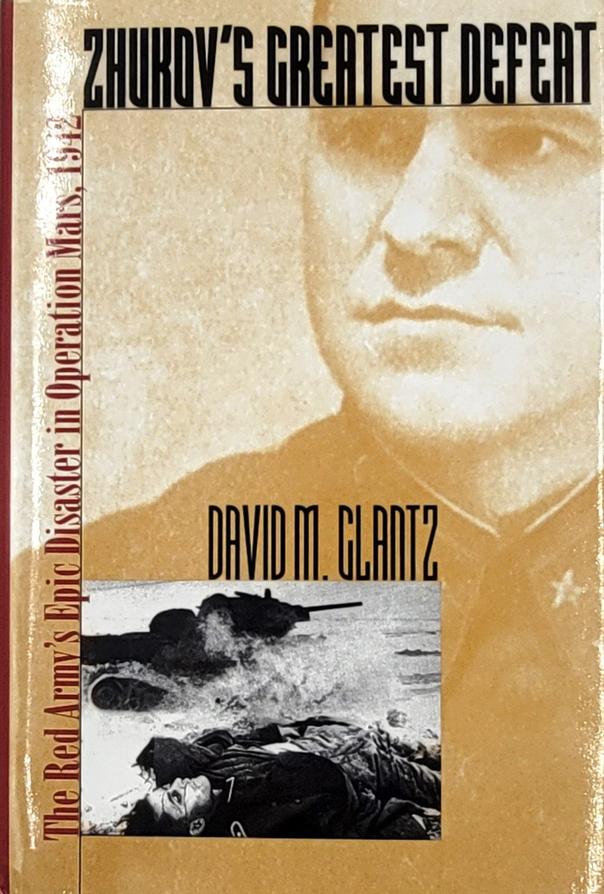
Another factor was Zhukov’s geographic placement during volatile moments. During the Winter War against Finland, while many commanders nearby failed or were purged, Zhukov commanded the Kiev Special Military District, far from the Western front and its disasters. This physical distance kept him away from direct blame or suspicion related to failures that spelled doom for others.
Public support for Zhukov also played an important role. He was a celebrated military figure among Soviet citizens, exemplifying heroism and competence. Stalin understood that purging a popular general risked backlash or unrest. This public image protected Zhukov from immediate targeting and contributed to his survival during Stalin’s ongoing political tightening.
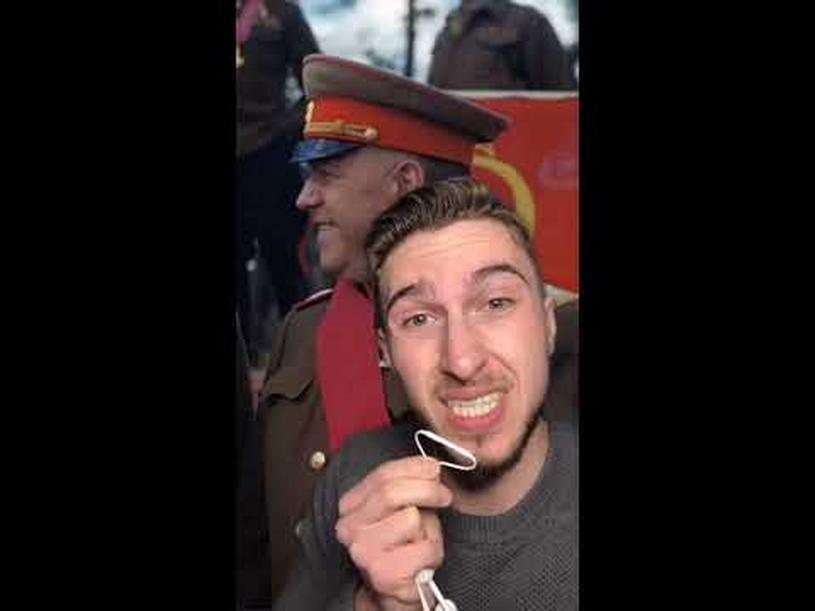
Zhukov’s associations further safeguarded him. He avoided ties with anti-Stalin factions or prominent purged figures, insulating him from accusations of disloyalty. Critically, figures like Marshal Budyonny, who denounced other senior officers, indirectly shielded Zhukov through their influence. This network helped Zhukov navigate the dangerous political terrain within the military.
Despite his survival, Zhukov’s postwar situation shows Stalin’s caution. Though too valuable to purge after World War II, Zhukov was sidelined and removed from the highest command roles during later political consolidations. Stalin assigned others, such as Malenkov, to carry out political purges and manage party affairs, minimizing Zhukov’s influence in civilian politics. This sidelining reflects Stalin’s wariness of Zhukov’s informal authority and potential as a power center within the army.
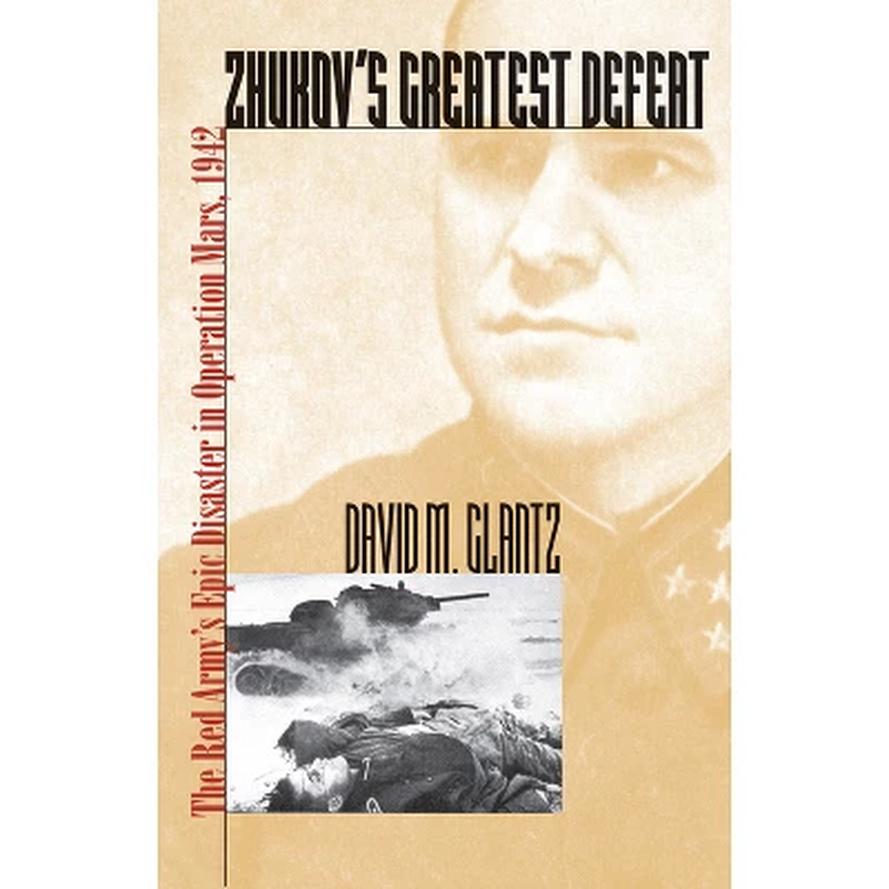
| Factor | Explanation |
|---|---|
| Peasant Origins | Aligned with Stalin’s background, marked as politically reliable. |
| Military Success | Victories at Nomonhan and leadership in combined arms warfare earned Stalin’s trust. |
| Lack of Political Threat | No evidence of Trotskyism or anti-Stalin alliances. |
| Geographic Placement | Command in Kiev during Winter War kept him away from failures. |
| Public Popularity | Widely admired by Soviet people, making purge politically risky. |
| Protective Associations | Supported indirectly by military figures loyal to Stalin. |
| Postwar Sidelining | Kept out of politics while remaining respected military figure. |
- Zhukov escaped purges by being strategically non-threatening politically and highly competent militarily.
- His peasant origin and civil war service earned Stalin’s trust.
- Military victories, especially at Nomonhan, boosted his indispensability.
- Distance from wartime failures minimized suspicion during purges.
- Public favoritism made purging him politically problematic.
- Less dangerous in political terms, Zhukov was sidelined, not purged, after the war.
How Did General Zhukov Not Get Purged?
General Georgy Zhukov avoided Stalin’s purges through a combination of unique factors: his humble background, outstanding military success, strategic distance during volatile times, and careful political navigation that kept him out of Stalin’s deadly “dangerous” categories. Let’s unpack this fascinating story.
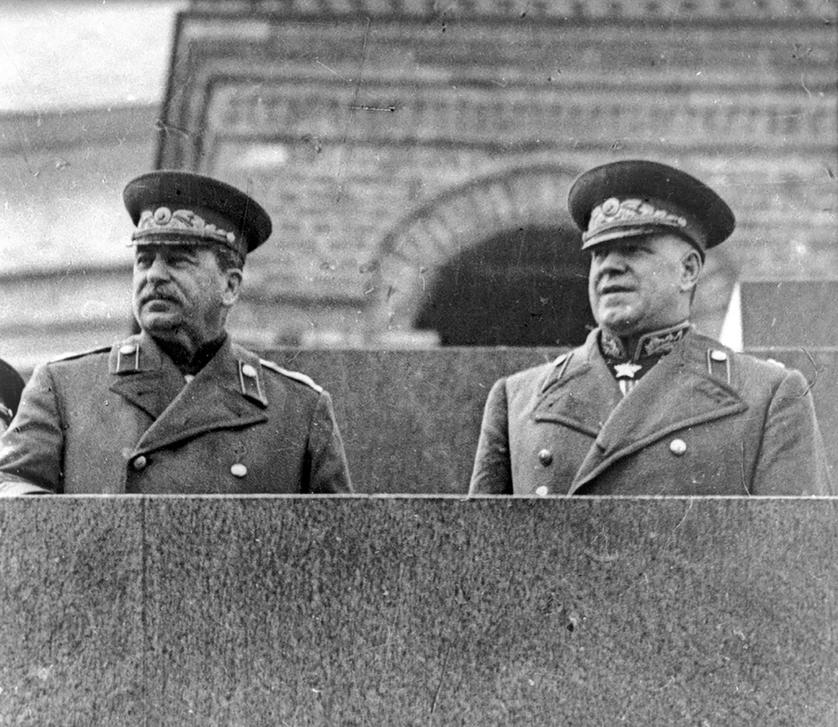
Think about the Great Purge under Stalin as a deadly game of “Who’s the Threat?” If Stalin sniffed even a hint of disloyalty or political ambition threatening his iron grip, a person vanished. But Zhukov? The man became a fortress in Stalin’s military landscape.
Stalin’s Purge Criteria: Selective and Brutal
Not everyone was on Stalin’s chopping block. The dictator was zeroed in on people he believed were potential threats: secret Trotskyists, old Tsarist officers, or anyone with serious political ambition. Zhukov, coming from a poor peasant family, did not fit this mold. He wasn’t plotting a political takeover in a smoky Kremlin backroom. Instead, he climbed the ranks with quiet grit and competence. Stalin didn’t view Zhukov as a political rival, which was a huge life insurance policy.
Military Mastery That Spared Him
Zhukov wasn’t just any officer. He was a mastermind of combined arms warfare, a military approach that became increasingly vital during the 1930s and ’40s. He mastered tanks and infantry coordination and wasn’t afraid to get his hands dirty on the battlefield. His historic victory at Nomonhan in August 1939, crushing a major Japanese incursion in the Far East, did more for his reputation than any propaganda poster could.
In fact, while Stalin was preoccupied with the Winter War fiasco against Finland in the West, Zhukov was racking up victories against the Japanese in the Far East. This geographical separation worked in his favor. Serving as commander of the Kiev Special Military District kept him well away from the Finnish disaster and consequent blame.
The Power of Popularity and Image
Here’s a twist: Zhukov was a *star*. The public loved him. Imagine a general so popular that taking him out would risk a backlash, however faint, within the military and public spheres. Stalin needed heroes to rally the nation, and Zhukov fit that role perfectly. His success wasn’t just military; it inspired confidence in the Soviet people.
Loyalty and Associations Matter Most
In Stalin’s Russia, it wasn’t just about ability; who you knew and where you came from often decided your fate. Zhukov’s peasant origins aligned with Stalin’s preference for leaders who had proven their loyalty and toughness through humble beginnings. Both men rose from the working class, a background Stalin trusted.
Zhukov had fought in the Russian Civil War, serving in the First Cavalry under Budyonny, who was a staunch Stalin ally. This part of Zhukov’s story is essential. Budyonny denounced Mikhail Tukhachevsky, the top military theorist who was purged. Because of such protection and loyalty chains, Zhukov’s survival wasn’t just luck—it was political insurance. He wasn’t tangled in any anti-Stalin factions, especially not Trotskyists, who famously fell victim to the purges.
Post-War Reality: Sidelined but Alive
After the war, Zhukov’s popularity skyrocketed, making him a thornier target for Stalin’s later purges, which were far less brutal than the ’36-’38 period. While not executed or exiled, he was sidelined strategically. Malenkov, Stalin’s close associate, did the dirty work of lowering Zhukov’s influence without the need for drastic measures. A quieter form of control replaced the earlier wave of terror. Being sidelined spared his life, keeping him in the political game without threatening Stalin directly.
Why Stalin Tolerated a Competent General
One might wonder why Stalin tolerated someone as talented and popular as Zhukov when he purged so many others. The answer lies in balance. Zhukov held enormous informal authority in the military, thanks to his civil war experience and World War II command. He was exactly the kind of leader rebels would turn to in chaotic times. Stalin knew trying to eliminate such a figure risked instability. Instead of breaking Zhukov, Stalin kept him close but firmly contained.
So, was Zhukov just lucky? Partially. But more importantly, he was smart. His loyalty appeared unwavering, his competence undeniable, and his background politically “safe.” Stalin had a brutal eye, but Zhukov didn’t blink, and that kept him alive.
Lessons from Zhukov’s Survival Tactics
For modern leaders or even you trying to navigate tricky situations, Zhukov’s story suggests some practical takeaways:
- Stay excellent at your core craft. Zhukov’s military skill gave him irreplaceable value.
- Know your network. Alliances matter as much as talent.
- Mind your background and avoid high-risk affiliations.
- Sometimes, staying geographically or politically “out of the spotlight” at the wrong moment can save you.
- Popularity can shield you—people will often defend the stars among them.
Does this mean talent always protects you in political storms? Of course not. Zhukov’s survival depended on a rare convergence of factors, many chaotic and unpredictable. But his story reminds us: sometimes being the best and the “right kind” of loyal can be your best defense against the storm.
Next time you think about Stalin’s purges, spare a thought for Zhukov—the man who dodged the deadly dance with death through hard-won battlefield brilliance, smart alliances, and a good dose of strategic luck.
